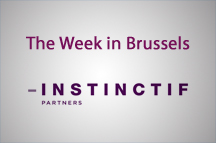 After months of political uncertainty that left European public affairs professionals as much in the dark as British businesses, Prime Minister Theresa May finally lifted the veil on her government’s approach towards negotiating the UK’s withdrawal from the EU. Speaking at her party conference on 2 October, May vowed to trigger Article 50 no later than March 2017, and to prioritise immigration policy over single market access.
After months of political uncertainty that left European public affairs professionals as much in the dark as British businesses, Prime Minister Theresa May finally lifted the veil on her government’s approach towards negotiating the UK’s withdrawal from the EU. Speaking at her party conference on 2 October, May vowed to trigger Article 50 no later than March 2017, and to prioritise immigration policy over single market access.
In decisively rejecting the “Norway option” or an “EU-lite” solution, the British Prime Minister vowed to make the UK a “fully independent, sovereign country” again, free from the jurisdiction of “supranational institutions” and with full control over immigration. While this pledge pleased the former Leave campaigners of her Cabinet, the new equation whereby Brexit doesn’t just mean ‘Brexit’, but what increasingly looks like a ‘Hard Brexit’, started a wave of newfound panic from British firms with operations across the Channel.
May sought to reassure them by pledging to seek the “the maximum freedom to trade” with the EU, but knowing the European Commission’s and Member States’ firm stance across the board on the indivisibility of the four freedoms, the “best possible deal” May can aspire to seems to be a Canadian-style free trade agreement – little help to those British companies whose primary exports are services, rather than goods.
 While European leaders such as European Council president Donald Tusk and the European Parliament’s chief Brexit negotiator Guy Verhofstadt, welcomed the clarity provided over the timeline of Brexit, they were also quick to put May’s plea to rest to commence informal talks before the Article 50 notification. Heads of governments of EU Member states further echoed this sentiment and reiterated their negotiating red lines.
While European leaders such as European Council president Donald Tusk and the European Parliament’s chief Brexit negotiator Guy Verhofstadt, welcomed the clarity provided over the timeline of Brexit, they were also quick to put May’s plea to rest to commence informal talks before the Article 50 notification. Heads of governments of EU Member states further echoed this sentiment and reiterated their negotiating red lines.
The award however, for toughest position on the UK this week goes hands down to Maltese Prime Minister Joseph Muscat, who will hold the Council Presidency next March, and argued in an interview that Brexit negotiations will go much like the Greek bailout went – the EU will play hardball, and the UK will eventually bend just like Greece did. But the UK is not on the verge of bankruptcy, and assessing the current political climate of Whitehall, divorce proceedings will sooner end in a complete split than in unappealing compromises.
Even though the new update on Brexit was surely the most discussed topic this week by Brussels professionals hanging out at their not-so-proverbial office watercoolers, the last couple of days has also brought about several sector specific developments. The most notable ones occurred in the area of Justice and Home Affairs, such as the COREPER agreement on visa liberalisation for Georgia, the Hungarian referendum on migration quotas with debatable results, and the launch of the European Border and Coast Guard.
However, in a stereotypical EU fashion, the most important Brussels moment this week took place not in Brussels, but in Strasbourg when on Wednesday, the European Parliament in the presence of UN Secretary-General Ban Ki-moon in the plenary room, gave its consent with an overwhelming majority to ratify the Paris Agreement on climate change, which then the Council concluded on behalf of the European Union.














